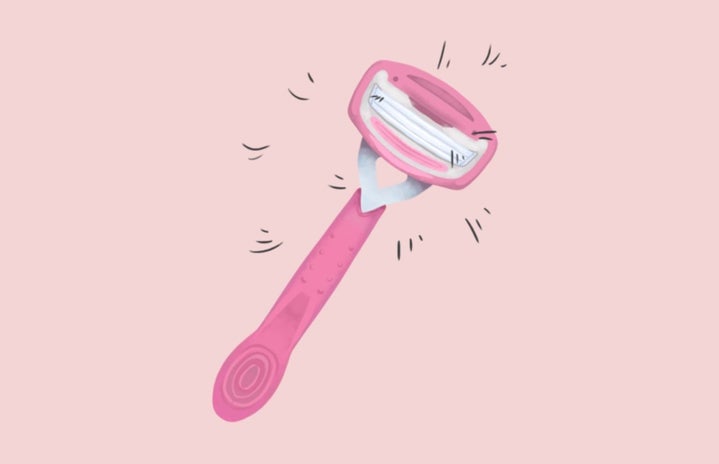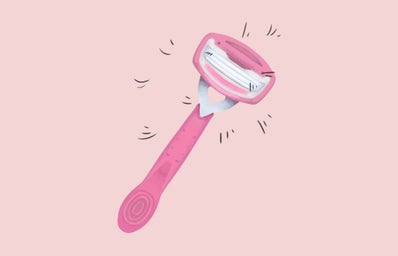“I feel like my entire life, I’ve been trying to conquer femininity, and somewhere along the way, I feel like femininity conquered me,” said Jules, hit television show Euphoria’s queer protagonist. She could not have said it any better. Good ol’ femininity–can’t live with it, can’t live without it. When I heard these words on my television, I could not get them out of my head.
It heavily resonated with me, making me ask myself: what does femininity mean to me? My femininity is presented in my long hair, in the colors I wear, in the bags I carry. Or is it not a question of presentation at all; is it something within? I search for the balance between nurturing being a woman while also working to not box myself into a label. How can we conquer femininity without letting it conquer us by giving it so much power?
One of the many roadblocks I found myself facing while exploring the nooks and crannies of so-called “womanhood,” was shaving. As the male-popularized “no-shave-November” approaches, shaving weighs heavily on my mind. Primarily in Western culture, visible body hair on women is extremely taboo. In the western world, about 99% of women remove some sort of body hair (Herzig). As early as 1964, 98% of women aged 18-44 regularly shaved their legs. While it is an astoundingly large percentage, it comes as little to no surprise. The origins of women shaving began in the early 1900s when the wheels of changing beauty standards were in motion, allowing Gillette to shape a new cultural phenomenon that has become bare-shaven women.
56% of women, according to a study conducted by Gillette, are dissatisfied with the way that the public portrays pubic hair shaving. Beauty standards are not static—and body hair is not exempt from that. Gillette Venus’ (Gillette’s female targeted product line) newest advertisement features the #ThePubeSong, released in May 2021.
Gillette responds to the newest wave of body hair normalization in this upbeat, theatrical song, performed by none other than a pube. Rather than shaming the presence of body hair, the ad recognizes the trials and tribulations of shaving it. What better to break down the taboo of pubic hair than a pubic hair itself—specifically, one that sings. Spoken like a true pube, “…there’s nothing diabolical about this little follicle. So take care of us, your pubic hair, if you trim, or you shave, or you’re bare down there, whichever ways your way, it’s all OK.”
In contrast to Gillette’s first wave of advertisements in the early 1900s, Gillette transitions from advertising by means of shame to advertising through acceptance. After all, that’s what the people want.
In 2013, 95% of women aged 18-24 reported shaving their underarm hair. In 2016, that number dropped to 77%. To mirror declining rates of women shaving their body hair, the razor market must evolve. In between the years 2017 to 2018, the razor market’s net worth dropped 4%, or $21 million.
Women have so many reasons not to shave, including to save money, avoid ingrown hairs, save time, etc. Among these reasons, some women share why they personally choose to forego shaving. Answers varied from, “…it’s natural and everyone has it, so why would I not love it?” to wanting to “…slowly rid myself of the scared little girl inside of me who was taught to be terrified of someone noticing the extra hair on my body.”
All justification to shave or not to shave are valid. That choice is up to us as individuals rather than societal views of what is correct. It’s okay to decide what you want and what is most comfortable for you. Women need to be accepted for who they are without outside intervention.
What is femininity to you? It may have nothing to do with whether or not you choose to shave your body hair—and that is okay. I am not asking that you look down upon those who choose to shave. However, I do ask that as women we ask ourselves why? I did not find some grand reason why women are predisposed to shaving their legs and underarms while men are not. Rather, commercialism perpetuated an entirely new beauty standard. Who are the executives at Gillette to tell us what to do based on what they see as the most profitable campaign?
You define your own femininity. And, just like our good friend, the singing pube says, “Why the mass hysteria about the pubic area?”… because that’s also up to you.
Sources
Why women feel pressured to shave
IN 2019, ARE PEOPLE STILL SHAVING THEIR BODIES?
10 Women Get Candid About Why They Stopped Shaving Their Body Hair

